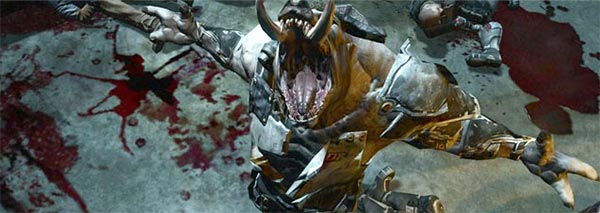
I miss demos. I miss them so much. I wouldn’t be here, writing these words, if it weren’t for demos: how else could a sport-fearing, skinny young misery with only the slightest pittance for pocketmoney have found his way into playing video games? Once, my bedroom was littered with floppy discs, each and every one of which had at some point led to me standing outside a game shop, counting pennies with a quivering hand, praying I had enough.
Granted, magazines were the gateway drug back then, when there was no way to watch a trailer or scour Facebook for new screenshots, but later in life the web too seemed an infinite fount of sampled digital delights, and led to any number of purchases of those games that seemed the most absorbing – or simply because the demo ended, apparently expertly, at a point which left me urgently hungry for more. Those days are gone.
Demos still exist and probably always will, but they’ve become the exception rather than the rule. Even in the last couple of years, the decline has been rapid – it’s a relative rarity to post about one on RPS now. Publishers seem to have settled on marketing and heavy, heavy promotion (often including bewildering ARGs) as the alternative – a surer way to drum up interest in and expectation for the game, and one that does so without the dread risk of a gamer discovering that, actually, they don’t like this all that much. For some really big games, the norm even seems to be not releasing a demo until weeks or months after the full release, presumably to help drum up those few stragglers who somehow resisted the pervasive trailers and advertisements. (Not PC-related, but I noticed a demo for Halo: Reach came out earlier this week. Timely, eh?)
Adverts and trailers don’t tell you the truth, but so often they’re all we get to go on until embargoes lift and launch-day reviews land. In a very fundamental way, such marketing lies about the experience you’re going to have. The camera angles are rarely those you’ll see yourself, while the checkpoints and the chokepoints and the guy named CockLord12 and all the minor irritations (and indeed minor, personal pleasures) you’d experience bear no mention. It sells an idealised version of the game experience, and one that leans far too closely to the movie model – nothing at all to do with the act of playing a videogame. I couldn’t buy a game based on promotion alone, and to be honest I probably couldn’t buy it on reviews alone – I need to try it myself, see whether it lights up those strange pathways in my brain that entail not just passing enjoyment but complete fixation upon the experience at hand. I need a demo.
This has happened in my recent as well as distant past. King’s Bounty: The Legend is a game I would probably never have encountered were it not for its demo. It’s certainly not a game I would have ended up evangelising while most of the rest of the games industry studiously ignored it. There’s any amount of weird and wonderful and terrible and indecipherable games out there that we may never hear of, because there wasn’t a demo than anyone could play right away. Even for mainstream games the perks are there: while Bioshock may have ultimately struggled to live up to its hype in some ways, let’s not forget the sheer excitement around its pre-release demo. It was a happy frenzy, a global gamer’s talking point in a way that a trailer or a pre-order incentive could never be.
The value and the interest that can stem from a good demo launched at the right time (right at the point where you can go on to spend money on the full thing) is surely incalculable, but its perception seems severely diminished of late. Marketing can be controlled, but a demo, an increasing refrain goes, is simply giving away precious content for free. In my stint working for GamesIndustry.biz, I heard any number of publishers and developers claiming that there were too many gamers out there somehow assembling a fully gaming diet simply by bouncing from demo to demo and never buying anything. If they bounced, that was surely either because they couldn’t find anything they really, truly wanted to stick to, or that they simply didn’t feel they could afford many games anyway. Nothing is lost – but a resultant sale to those who are suitably enraptured is that much more likely.
The decline of demos probably too stems from the budgets and manhours necessary to turn out a modern, high-end video game – to pour yet more resources into a tailored slice of interactive demonstration is no doubt unappealing to a team beaten down by crunchtime. I’m deeply worried that publishers are calling the shots though, worried that a demo undermines marketing efforts – worried about gamers actually seeing the game, for fear a different message is sold. Call of Duty is an easy example – the hype and sense of event around what it’s going to be, what’s going to happen would perhaps be deflated by a demo’s concrete proof that beneath the clamour it’s just another high-budget shooter very similar to the last one. Which is not actually to malign CoD, but to comment on the fact that the promotion makes it into something almost mystical, something far beyond any possible reality. Bringing expectations down to Earth is probably the last thing the publisher wants.
Selling a different reality and avoiding exposing the reality can happen in more direct fashion too – take Brink’s splendid-looking TV adverts, for example. They suggest something very action movie, very glossy and very narrative-driven, rather than the solid, tactical and clever team shooter the game really is. As a result, we have a mixed message, but I’m convinced a demo finding its way to curious gamers would serve to strengthen their sense of, and hopefully interest in, Splash Damage’s thoughtful multiplayer game.
The other side of the coin is making the increasing rareness of a demo a promotional event in itself – the Duke Nukem Forever demo got its own announcement video, and will for a while be made exclusive to people who bought specific editions of Borderlands. It’s not about promoting the game, about letting people establish whether or not they’re interested in the game, but instead it’s treated as a reward to be fought and paid for, a product in itself: the polar opposite of the traditional demo. I don’t like having to beg to be marketed at. See also: Facebook Likes unlocking screenshots. Promotion becomes the reward, one we plead for rather than one we choose to assess.
Many indies know better, or at least know that because they lack the option of brute-force, high-spend marketing they have to use other means of letting people know what their game is like. Take a look at demo-hub GamersHell and there are so, so few game demos listed there – and of those that are, the vast majority are indie. Yet still so many indies resist – even most of the mails we get from indie devs simply contain a link to a trailer, with the lack of anything playable both complicating what we can usefully say about the game and the possibility of it capturing the affections of our readers. Frozen Synapse is out today, for instance. It’s ace, you should try it and see if you like it as much as I do. Oh, you can’t. Watch a trailer, I guess.
Of course, the rise of free to play may turn things more demo-wards in a way. The first hit’s free, kids, but cough up now if you want to play the rest. I’m actually more than fine with that model – it’s when you have to seperately pay for features or an advantage that the F2P concept makes me ill at ease. Have a go, work out if it’s for you, pay to unlock the rest has forever seemed an eminently sensible way to market a game. Unless it’s a game with a really boring beginning that’s mostly tutorial and exposition, of course, but that’s a whole other kettle of silly design decisions. (Which reminds me of an earlier post about demos, and why they’re so often very wrong and even misleading to focus on the first chunk of a game).
Demos: come back. They’re why we found games, why we experienced so much, and why we spent so damned much. You are not a relic of a more naive age, but the key to future discovery. We need you. The industry needs you.
By Alec Meer via http://www.rockpapershotgun.com/2011/05/26/the-slow-strange-death-of-the-demo/#more-60338
The Slow, Strange Death Of The Demo
 14:03
14:03
 justforkicks
justforkicks








0 comments:
Post a Comment